A major transition to cleaner marine fuels is proceeding smoothly, according to data released today from the American Petroleum Institute’s January 2020 Monthly Statistical Report (MSR). The International Maritime Organization’s (IMO) new low-sulfur emission standard for marine fuels – also known as IMO 2020 – went into effect on January 1 without significant market disruption.
“American refiners invested more than $100 billion over the past decade to ensure their readiness for this historic switch, which strengthens American energy security while simultaneously driving environmental progress in the international marine shipping industry,” said API Chief Economist Dean Foreman. “Despite previous uncertainty, the IMO 2020 transition has been relatively smooth sailing with refiners demonstrating flexibility to accommodate greater demand for low-sulfur fuels with limited impacts on diesel fuel prices and the broader supply chain.”
Highlights from the January 2020 MSR include:
- U.S. petroleum demand decreased in January but remained near the top of the five-year range
- Productivity and well completions drove record U.S. crude oil production (13.0 mb/d)
- Crude oil exports in January (3.4 mb/d) drove U.S. a total petroleum export record for the month
- Refinery throughput and capacity utilization rates declined in January
- Total inventories increased year-on-year for the 15th consecutive month
API represents all segments of America’s oil and natural gas industry.









